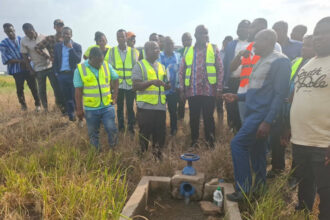Discussants at a roadshow in Accra have called for a harmonised and stronger competition law regime in Africa.
The panelists, who have wide expertise in law, economics, trade and politics, said the lack of such a system in place had given room to multi-nationals and developed countries to take advantage of African nations.
Speaking at the International Commercial and Trade Africa Roadshow in Accra, the panellists insisted that the time had come for African countries to learn from the developed world to maximise the gains from their natural resources for the benefit of the continent.
A panellist and a former Dean of the Ghana Institute of Management and Public Administration (GIMPA) Law Faculty, Mr Kofi Abotsi said: “Competition laws can be effective only if Africans have laws that are in sync in dealing with multi-nationals.”
“If that is not done, African countries will be creating a certain vacuum that the multi-nationals will be taking advantage of.”
Africa Trade Roadshow
The programme was organised by Baker McKenzie, an international legal, commercial, and trade practice firm, and Kimathi and Partners, a legal firm in Ghana.
It presented an opportunity for participants to be abreast of the latest global updates on the trade and commercial landscape and their implications for companies doing business in the region.
The two main topics discussed were “The Geopolitical Landscape: Perspectives in the Africa Continental Free Trade Area (AfCFTA) and Foreign Direct Investments, Infrastructure, and China’s Belt and Road Initiative” and “Insights from the EU in building a stronger African Competition Law Regime and Implications of technology in the future of law practice.”
Other members of the panel were the Director of the Centre for Asian Studies at the University of Ghana, Dr Lloyd Amoah; the Director of Legal Affairs at the Ministry of Trade and Industry (MoTI), Mr Kofi Amenya; the Director of Africa Corporate Network of The Economist, Mr Herman Warren; an Associate of Baker McKenzie at Johannesburg in South Africa, Ms Keitumetse Makhubedu, and an Associate of Baker McKenzie at London, Ms Meera Rolaz.
The programme was moderated by Mr Kimathi Kuenyehia, a Partner at Kimathi and Partners.
Advantages of competition law
Mr Amenya indicated that competition law was important because it led to price reduction in goods and services and brought improvement in technology.
“There are plans in place to even ensure that Africans operate like the European Union,” he said.
Chinese example
Citing the Chinese way of development as an example, Dr Amoah said Africans must develop strategic and tactical policies that could match the western countries, “by learning from the Chinese example.”
“The Chinese have done so much for Africans as far as development is concerned, and they can learn from that.
“Africans must learn from the hypocrisy of Europeans and Americans, and not look at China with evil eyes,” he emphasised.
According Dr Amoah, the Chinese took a lot of time and pain to adopt a particular module of development “as a result, they do not open their markets without proper strategies in place like Ghana.”
For his part, Mr Warren stated that the Chinese economy had grown to the point that if it encountered any challenge, it could have a bigger problem for the global economy.
Even though he admitted that the Chinese presence in Africa had brought its challenges, he added that they were assisting the continent in many ways.
Source: Graphic.com.gh













